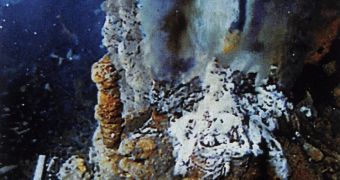Undersea hydrothermal vents can be the most ancient ecosystems on Earth. They may have existed ever since the beginning of life on Earth and before the emergence of photosynthesis.
The food chains of the hot vents are not based on solar light but on the chemical energy stored by sulphur metabolizing bacteria, which are the source of organic chemicals for complex communities of worms, clams, crabs, fish and many other groups. They are like submarine geysers, being the result of the activity of submarine volcanoes.
The vents spit off 350? C hot water rich on sulfur and other minerals into the frigid deep-sea environment. Since their discovery in the '70s it was believed that all life on Earth required Sun's energy, but they came with the first proof of life based on chemical energy.
Now these habitats supporting weird and potentially valuable organisms for pharmaceutical and biotechnological applications face the risk from seafloor mining which could start before 2010. Extracting sulphide from the deposits surrounding the vents could produce ravages and contaminate these communities.
"We need to act now to establish scientific and legal methods to protect these sensitive ecosystems and minimize the potential environmental impact of this industry," said lead author Jochen Halfar, an assistant professor of earth sciences at University of Toronto Mississauga.
"Imposing regulations after operations begin would prove very difficult and some of the governments in the jurisdictions targeted by this industry have a poor record of mining oversight. The prospects for regulation of underwater mining are not good."
A Canadian-based company is already planning to start the first ever commercial undersea extraction for high-grade gold and copper in the Manus backarc basin, off Papua New Guinea. Till now, high costs and the regulatory restrictions on deep-sea mining in international waters through the United Nations Convention on the Law of the Sea (UNCLOS) have detained such projects.
"In particular restrictions by the International Seabed Authority-which overseas environmental protection and demands that profits from mining in international waters be shared with developing nations-redirected prospecting and exploration of the seafloor into areas under national jurisdiction, where regulations are often weaker or non-existent." said Halfar.

 14 DAY TRIAL //
14 DAY TRIAL //